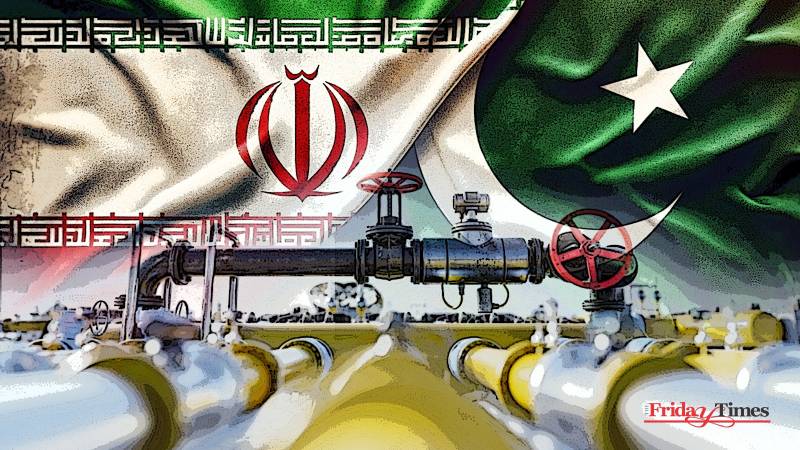
Pakistan’s government recently announced its intention to seek a waiver from the sanctions America imposes on nations that trade with Iran so it can finally complete the long-delayed Peace Pipeline between both countries. Which is a fancy way of saying it is asking America for permission. Sadly, the US has signaled it will not agree, dashing the government’s hopes.
This project is designed to supply Pakistan with 750 million cubic feet of natural gas a day. This would allow it to generate 5,000 megawatts of power for Pakistan’s energy starved cities and factories. Not only would completing this pipeline significantly enhance Pakistan’s energy security, it would also further improve connectivity with Iran, which is vital to Pakistan’s interests for a variety of reasons.
As the author has argued many times, creating a free trade zone and security organization similar to NATO between Pakistan, Iran, and Turkey represents the best long term plan to improve each nation’s geopolitical and economic positions. Doing so would create a large internal market comprised of over 400 million people while significantly improving their national security situations. At the least, connecting to Iran is an important prerequisite if Pakistan ever hopes to substantially increase trade with Turkey, a key ally. As such, for both economic and military reasons, building infrastructure with Iran is vital to Pakistan’s long term national interests.
Pakistan’s servility is a by-product of its authoritarian political institutions and lack of democracy. This has led to the creation of a political economy designed to serve the narrow interests of its elite rather than empower the masses.
The fact that Pakistan’s leaders must beg America for permission or, as Pakistani President Asif Zardari suggested in the face of America’s opposition, resort to medieval forms of barter trade to pursue policies that are so important to its interests is both embarrassing and infuriating. It also provides yet another example of how incredibly weak and subservient Pakistan still is to the Western powers. Instead of taking orders from colonial rulers in London, Pakistan’s leaders must now obey neocolonial masters in Washington DC.
Despite what America’s imperial overlords may think, they have no right to decide who Pakistan can trade with just as Pakistan has no right to decide which nations America can trade with. Unfortunately, despite gaining its independence nearly 80 years ago, Pakistan is still too weak to be the master of its own fate.
Pakistan’s servility is a by-product of its authoritarian political institutions and lack of democracy. This has led to the creation of a political economy designed to serve the narrow interests of its elite rather than empower the masses. As a result, Pakistan’s government has proven incapable of building an economy and technological base that would allow it to act as a truly independent nation.
Of course, Pakistan is a microcosm of the wider Muslim world, which is also incredibly weak for much the same reasons. Nearly every Muslim nation is ruled by tyrants who secure their power through violence instead of the consent of their people. This has made them too weak and unstable to effectively challenge America’s domination of their lands.
Unity between Muslims, by itself, will not be enough to end America’s dominance. But it is an important facet of the multi-pronged approach Muslims must take if they wish to destroy the neocolonial power structures that have ensnared them since the end of the colonial era.
Instead of seeking America’s approval, Pakistan and the entire Muslim world should be working together to oppose its hegemonic policies. Between its unequivocal support for apartheid Israel, the invasions of Iraq and Afghanistan and its massive weapons sales to the region’s many dictators, America has the blood of millions of Muslims on its hands. The massacre it is currently enabling in Gaza is only its most recent crime and pales in comparison to the 576,000 children it starved to death in Iraq, the estimated 4.5 million souls who died because of its supposed “War on Terror,” or the 377,000 Yemeni civilians it helped Saudi Arabia murder.
This pattern of violence and domination will never end until Muslims take the steps needed to end it. Part of that process must entail building stronger connections to each other. By obeying America’s orders and refusing to develop close ties with Iran, Pakistan’s leaders are helping to perpetuate its control of the region.
America will not allow Pakistan to trade with Iran because it refuses to accept America’s violent control and subjugation of the Muslim world. Due to its anti-imperial policies, Iran is the only country that has meaningfully tried to help the Palestinians by giving them the means to defend themselves against Israel’s genocidal violence. It also refuses to allow the West to control its natural resources. For these “crimes,” it has been isolated and attacked.
Unity between Muslims, by itself, will not be enough to end America’s dominance. But it is an important facet of the multi-pronged approach Muslims must take if they wish to destroy the neocolonial power structures that have ensnared them since the end of the colonial era. The most important step towards that end would be creating democratic political institutions based on the rule of law that guarantee freedom of expression and religion for all citizens.
That is the most logical way to stimulate the sort of economic and technological development that could finally free the Muslim world. But building infrastructure and new economic institutions that do not depend on the US dollar to facilitate trade between Muslim nations would also be vitally important. Which is why, when it comes to completing the Peace Pipeline, the best thing Pakistan’s leaders can do is tell America and its imperial pretensions to go to hell.

